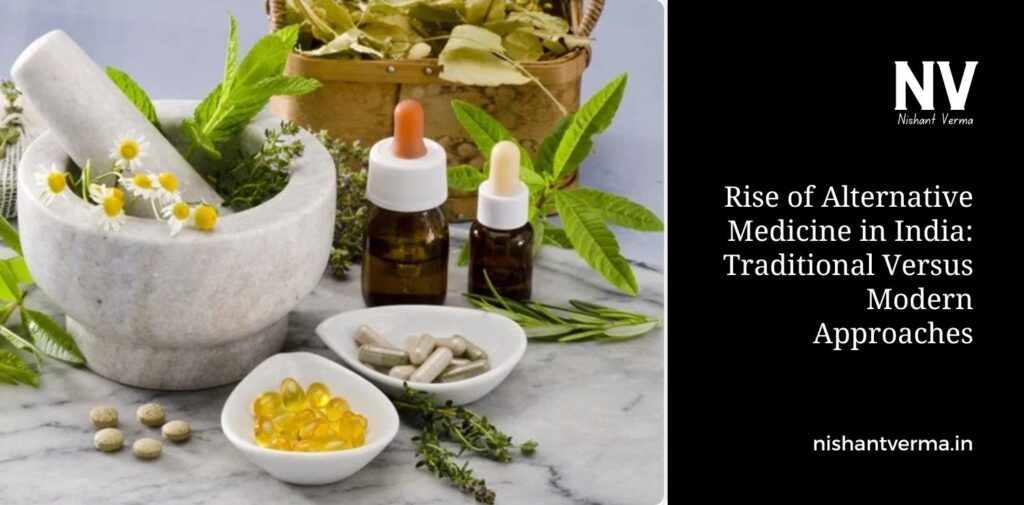In India, people have used various forms of medicine for thousands of years. From ancient practices like Ayurveda and Yoga to modern-day treatments like allopathy (conventional medicine), there has always been a strong interest in health and healing. In recent years, there has been a rise in the popularity of alternative medicine, which includes both traditional methods and newer treatments that do not always follow the principles of modern medicine.
In this article, we will explore how traditional and modern approaches to medicine have evolved in India. We will look at the rise of alternative medicine, how it compares with modern methods, and what the future might hold for health practices in India.

What is Alternative Medicine?
Before we dive into the details, it’s important to understand what alternative medicine means. Simply put, alternative medicine refers to treatments and healing methods that are different from the standard, widely accepted medical practices. These methods can include traditional medicines that have been used for centuries, as well as newer forms of treatment that don’t always fit with the modern, scientific understanding of medicine.
In India, alternative medicine includes systems like Ayurveda, Homeopathy, Naturopathy, Unani, and Traditional Chinese Medicine. These are often considered complementary to modern treatments and can be used alongside or instead of conventional medical treatments. Many people are now turning to these alternatives to treat various health issues.
Traditional Medicine in India
India has a long history of traditional medicine, with Ayurveda being one of the most well-known and widely practiced systems. Ayurveda is a system of medicine that has been used for over 5,000 years. It focuses on maintaining a balance between the mind, body, and spirit for overall health and well-being. According to Ayurveda, every person is unique, and treatments are customized based on their body type, lifestyle, and environment.
Apart from Ayurveda, Yoga is another ancient practice in India that is often used for health and healing. It includes physical postures (asanas), breathing exercises (pranayama), and meditation to promote physical and mental health. Unani medicine, which originated in ancient Greece and was later developed in India, focuses on the balance of the four elements—earth, air, fire, and water—to maintain health.
Traditional Indian medicine emphasizes the use of natural ingredients, such as herbs, minerals, and plant-based products, to heal the body and mind. These systems of medicine rely on holistic approaches, meaning they look at the whole person—body, mind, and environment—rather than just treating a specific symptom or illness.
Modern Medicine in India
In contrast to traditional medicine, modern medicine (also known as allopathy) is based on scientific research, laboratory studies, and evidence-based treatments. This system is widely used around the world and focuses on diagnosing and treating diseases through medications, surgeries, and other advanced medical technologies.
Modern medicine has had a huge impact on health care in India, especially since the country gained independence in 1947. Hospitals, medical colleges, and research centers have grown in number, and millions of people rely on conventional treatments to cure or manage health problems. Doctors trained in modern medicine use drugs, vaccines, and surgical procedures to treat various health conditions, from common colds to complex surgeries.
While modern medicine has brought many benefits, it has also faced some challenges. For example, not everyone in India can afford expensive medical treatments or have access to quality health care. In addition, some people experience side effects from pharmaceutical drugs, leading them to seek alternatives.
The Rise of Alternative Medicine in India
In recent years, there has been a noticeable rise in the popularity of alternative medicine in India. Many people are turning to traditional and complementary health practices to manage their health, often alongside modern treatments. This rise is partly due to a growing interest in natural and holistic healing methods. People are seeking ways to improve their overall well-being, not just treat symptoms, and alternative medicine offers this approach.
One reason for the rise of alternative medicine is the growing awareness about the side effects of modern drugs. Sometimes, people who use allopathic medicine for long periods may experience unwanted side effects, which makes them look for safer, natural alternatives. Practices like Ayurveda, Yoga, and Homeopathy are seen as gentler and more natural, making them appealing to many individuals.
Another reason for the rise of alternative medicine is the changing attitudes toward health. People are now more conscious of their lifestyle choices, including diet, exercise, and mental health. Alternative medicine often encourages healthy lifestyle habits, like eating organic foods, practicing meditation, and using natural remedies, which aligns with these new attitudes.

Traditional Medicine vs. Modern Medicine
Now, let’s compare traditional medicine with modern medicine to see how they are different and how they complement each other.
- Approach to Healing
- Traditional Medicine: It focuses on the whole person—body, mind, and spirit. It believes in the balance of energies and uses natural ingredients and practices like herbs, yoga, and meditation to heal.
- Modern Medicine: Modern medicine is more focused on the disease or illness itself. It uses scientific methods to diagnose and treat diseases, often through medication, surgery, and other advanced medical techniques.
- Treatment Philosophy
- Traditional Medicine: It treats the root cause of the illness, aiming for long-term health and well-being. Treatments are often personalized, based on an individual’s unique body type and needs.
- Modern Medicine: Modern treatments are often symptom-based and aim to cure or manage diseases quickly. It is more focused on quick relief, such as curing infections with antibiotics or managing chronic conditions with medication.
- Prevention
- Traditional Medicine: Prevention is a big part of traditional practices. Ayurveda, for example, focuses on maintaining balance in the body and avoiding illnesses by following a healthy lifestyle, proper diet, and regular exercise.
- Modern Medicine: While modern medicine also focuses on prevention, it often involves vaccinations, health check-ups, and screenings to catch diseases early.
- Side Effects
- Traditional Medicine: Since traditional medicine relies on natural herbs and non-invasive treatments, it is often considered safer and with fewer side effects. However, some people may still experience mild reactions to certain herbs or treatments.
- Modern Medicine: While modern medicine is effective, it can sometimes lead to side effects. For example, certain medications may have unwanted effects like dizziness, nausea, or skin rashes. However, these side effects are often well-known and managed carefully.
The Role of Alternative Medicine in India’s Health System
Alternative medicine is increasingly becoming an important part of the Indian healthcare system. While modern medicine is essential for treating many diseases, alternative medicine offers a complementary approach that many people find helpful. India is home to several government initiatives that support traditional practices like Ayurveda and Homeopathy, and many universities offer courses in these fields.
In fact, the government has established a special ministry called the Ministry of AYUSH (Ayurveda, Yoga, Unani, Siddha, and Homeopathy) to promote and regulate alternative medicine practices. This has helped raise awareness and support for these practices in both India and abroad.
Challenges and Criticism of Alternative Medicine
While alternative medicine is growing in popularity, it is not without its challenges. One major issue is that some alternative treatments have not been scientifically proven to be effective. This means that while people may feel better after using these treatments, there is not always enough evidence to show they work in the same way that modern medicines do.
There is also a lack of regulation in the field of alternative medicine. Not all practitioners are properly trained, and some may offer treatments that are not safe or effective. This is why it is important for people to seek trusted, qualified practitioners and ensure that treatments are backed by research and evidence.

The Future of Medicine in India
The future of medicine in India will likely involve a combination of traditional and modern practices. As people become more aware of the benefits of both approaches, there will likely be more collaboration between traditional and modern healthcare systems. We may see more research being done on alternative treatments to scientifically prove their effectiveness.
In the coming years, we may also see an increased focus on integrative medicine, which combines the best of both worlds—modern medical practices and traditional healing methods. This approach could lead to more holistic and personalized care for patients.
Conclusion
In India, the rise of alternative medicine reflects a growing interest in natural, holistic healing methods. While modern medicine continues to play a vital role in treating diseases, many people are turning to traditional practices like Ayurveda, Yoga, and Homeopathy for preventive care and overall well-being. These two approaches—traditional and modern—can work together to create a more comprehensive healthcare system, helping people lead healthier and happier lives. As the demand for alternative medicine grows, it will be important to ensure that these practices are safe, regulated, and supported by research, so they can continue to benefit people across India and beyond.




